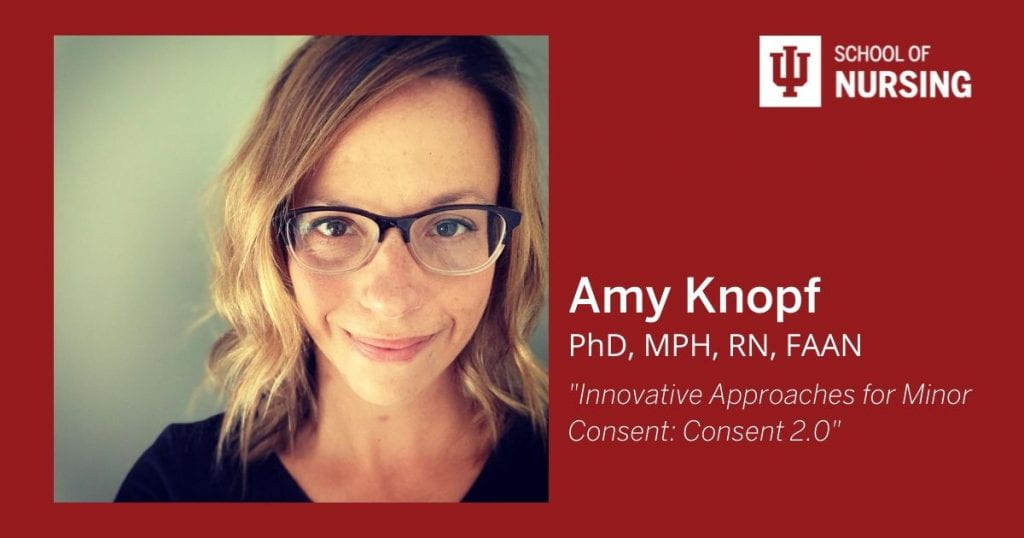Today in the United States, one in five new HIV diagnoses occurs in people ages 13 to 24. To treat this age group effectively, researchers must first learn which treatment and prevention methods work best for them, but including minors in studies can be a complicated process.
Typically, researchers can't include teenagers in studies without parental consent. Nurse scientist and IU School of Nursing assistant professor Amy Knopf, PhD, MPH, RN, FAAN, and her team are working to understand the impact of this requirement and eventually, create a guide to help researchers develop studies for teens involving sensitive health topics, such as HIV.
"HIV diagnoses for those at highest risk of infection occur fairly early in life--so it is really important to engage people during adolescence and early young adulthood," says Knopf.
HIV diagnoses for those at highest risk of infection occur fairly early in life--so it is really important to engage people during adolescence and early young adulthood.”
The first phase of Knopf's research on the topic was a multi-site study focused on teens ages 14 to 17. Funded by a $1.1 million award supported by the Adolescent Medicine Trials Network for HIV/AIDS Interventions*, it asked teens and parents how they felt about three different consent models: autonomous minor consent, in which teens could take part without notifying an adult, adult permission required and parental permission required.
Not surprisingly, parents favored the traditional consent model.
"Parents felt strongly that they should be involved in allowing their minor adolescents to take part," says Knopf.
However, the response from the teens surprised Knopf and her team.
"Their willingness to participate, just in a really broad sense, did not vary by the requirements for parental permission,” she says.
Knopf says this finding differs from previous studies, in which a majority of teens indicated they were unwilling to take part in a trial that required parental consent. The research team is exploring some possible explanations for the finding, but their prior research indicates teens--especially LGBTQ teens--experience significant social benefits from participating in clinical research. Therefore, the relationship between the disclosure of sexual identity, parental engagement in the consent process, and willingness to participate in research may be more complex than they initially thought.
"That was the goal with our project," says Knopf. "We wanted to answer questions about the consent process with empirical evidence and particularly, to make it as realistic as possible."
Knopf is now leading a follow-up study that may help researchers use a method, called public deliberation, to deal with sensitive issues around informed consent. In a public deliberation, people learn about an issue that affects their community and work together as a group to develop solutions.
"Even though we found in the first study that adolescents were willing to participate across consent groups, there were still, within these groups, adolescents who would definitely not participate or who were reluctant," says Knopf. "We felt it was important to bring adolescents and parents together to talk about this issue as a group and come up with the least-objectionable compromise."
The hope is that finding a consent process that's acceptable to both parents and teens could help improve recruitment and enrollment of teens at high risk for HIV in biomedical prevention trials. The overall goal would be to pinpoint new drugs and prevention models that help reduce HIV infection rates among this generation.
As Knopf has noted, this is especially relevant as "we get closer and closer to an HIV vaccine and other biomedical approaches that will need to be tested in adolescents before they can be used with this high-risk group."
More information about phase one of Knopf's project, "Innovative Approaches for Minor Consent: Consent 2.0," can be found at ClinicalTrials.gov.
*The study "Innovative Approaches for Minor Consent: Consent 2.0," is supported by the Adolescent Medicine Trials Network for HIV/AIDS Interventions. The Network, also known as ATN, is funded by the Eunice Kennedy Shriver National Institute of Child Health and Human Development with support from the National Institute of Mental Health, the National Institute on Drug Abuse, and the National Institute on Minority Health and Health Disparities.


